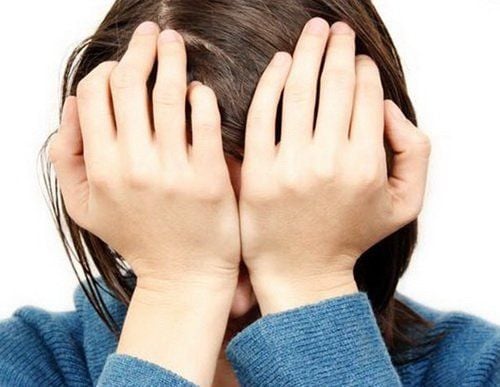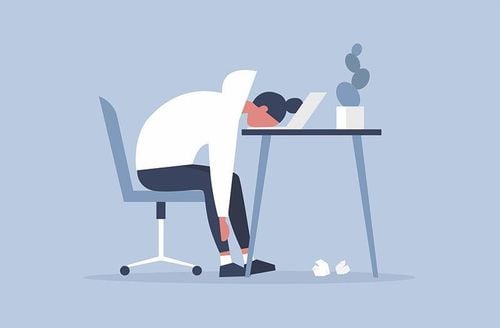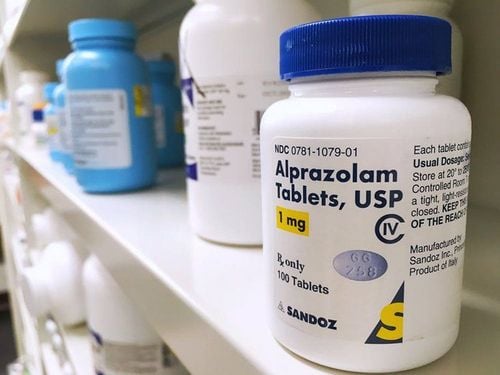This is an automatically translated article.
Depression is a mood disorder that causes many negative effects on the emotions, thoughts and behaviors of people, especially women. It causes feelings of sadness, anxiety, disorientation, lack of motivation and severely affects quality of life.1. What is depression?
Depression is a dangerous and potentially progressive mood disorder. It causes feelings of sadness, disorientation, lack of motivation and low self-esteem. From mild to moderate severity, the disease occurs with symptoms of apathy, loss of appetite, trouble sleeping, low self-esteem, mild fatigue and can progress to more severe.2. Manifestations of depression in women
Symptoms of depression in women include:Sad mood, anxiety, feeling "empty" Loss of interest, pleasure in life activities, including sex Restlessness, irritability, crying a lot Feelings of guilt, helplessness, lack of confidence in life, low self-esteem Sleeping too much or too little, waking up early in the morning Loss of appetite and/or weight loss Overeating and/or weight gain Lack of energy, fatigue, feeling "slowed down" Difficulty concentrating, remembering, making decisions Headaches, persistent digestive upset Thoughts of death, suicide, or suicide attempts
3. What increases the risk of depression in women?
According to the National Institutes of Health, a woman's risk of developing depression is often influenced by reproductive factors, genetics, and certain psychological and personality traits. Women taking care of young children and single mothers are also susceptible to depression. Specific factors are as follows:Family history of mood disorders History of mood disorders in the early postpartum years Loss of a parent before the age of 10 Years of community alienation or similar loss-making factors Self-emotional stress from job loss, relationships, separation, divorce Workplace or childhood sexual abuse Due to the effects of certain medications Postpartum women and seasonal depression , especially in winter

Căng thẳng tâm lý do mất việc, các mối quan hệ, ly thân, ly hôn có thể làm tăng nguy cơ trầm cảm ở phụ nữ
4. Is depression hereditary?
Depression has a genetic potential in women, occurring mainly between the ages of 15 and 30. However, the cause of depression is not always linked to clear genetic factors. clear.5. How is depression in women different from depression in men?
Depression in women has many differences from depression in men:Depression in women often occurs earlier, lasts longer, has a higher chance of recurrence than men. It is often caused by a prolonged state of stress and is sensitive to seasonal emotional changes. Women with depression often experience more guilt and suicide attempts than men, despite the fact that suicide rates are lower among women than men. Depression in women is often associated with anxiety disorders, especially symptoms of panic attacks, phobias, and eating disorders.
6. Why is depression more common in women than depression in men?
Before adolescence, the risk of depression in girls and boys is about the same. Entering puberty, the risk of depression in girls doubles compared to boys.Some experts suggest that the high prevalence of depression in females is related to changes in hormone levels throughout life, especially during periods of the most obvious changes in concentrations such as puberty, pregnancy, menopause, childbirth.
Additionally, hormone levels that fluctuate with the menstrual cycle each month can contribute to premenstrual syndrome (PMS) or severe premenstrual dysphoric disorder (PMDD). These are conditions related to depression, anxiety and mood swings that occur in the week before menstruation and affect activities of daily living.
7. Are PMS and PMDD related to depression in women?
Premenstrual syndrome (PMS) occurs in every 3 out of 4 women who menstruate. PMS is a disorder characterized by symptoms that change physically and mentally according to fluctuating hormone levels during each menstrual cycle. The disease is common in women between the ages of 20 and 30.About 3% to 5% of menstruating women have severe premenstrual dysphoric disorder (PMDD). PMDD is a form of the disease with similar symptoms but more severe severity of PMS. Symptoms become severe 7-10 days before menstruation.
Currently, scientists have only suspected but not yet determined the exact relationship between PMS, PMDD and depression. Any condition that alters the brain's mood-regulating activity along with fluctuating hormone levels can be a risk factor.
8. How are PMS and PMDD treated?

Tập thể dục và thiền có thể giúp ích trong quá trình điều trị PMS và PMDD
9. Depression often occurs during pregnancy?
Pregnancy is considered a happy time, helping to protect women from mental disorders. However, recent research results show that the rates of depression in pregnant and non-pregnant women are similar. What factors increase the risk of depression in pregnant women?History of depression or PMDD Maternal age at pregnancy: Younger age, higher risk of depression Living alone Less attention from others Marital conflict Intent to abort the baby
10. What are the effects of depression on pregnancy?
The potential effects of depression on pregnancy include:Depression can interfere with a woman's ability to take care of herself during pregnancy. High risk that a woman will not follow the instructions for maternity care during pregnancy, eat and sleep improperly. Depression can cause a woman to use substances such as tobacco, alcohol, and/or other drugs that can harm the baby. Depression can make it difficult to bond emotionally. In addition, pregnancy has the opposite effect on depression in women:
Stresses during pregnancy can contribute to progression/relapse/aggravation of depressive symptoms. Depression during pregnancy may increase the risk of postpartum depression.
11. What to do when you have gestational depression?

Trong trường hợp bạn bị trầm cảm thai kỳ, bạn nêu ưu tiên chăm sóc sức khỏe của chính mình
If you have increased anxiety, feelings of frustration, then consider implementing therapy. You can talk to your doctor to get referrals to reputable mental health centers for treatment.
12. How is depression during pregnancy treated?
Currently, antidepressants (most SSRIs, except Paxil) carry a risk of affecting the fetus. Depending on the type of drug used, there are different effects. Therefore, you should consult with your doctor about the benefits and risks of treatment for depression during pregnancy to make the right choice.However, if depression is left untreated, it can be dangerous for both mother and unborn baby. Electroconvulsive therapy (ECT) is sometimes used to treat major depression during pregnancy when other methods have not worked.
13. How is postpartum depression in women treated?
Postpartum depression is often treated like other forms of depression with medication and psychotherapy. If a nursing woman wants to use an antidepressant, she should consult a doctor before deciding to use the drug. Antidepressants exist in small amounts in breast milk, and their effects on infants are poorly understood.Currently, brexanolone (Zulresso), a new drug has been approved for the treatment of postpartum depression. It is given by intravenous injection over a period of 3 days, and is effective for most women.
14. Does the rate of depression among women increase in middle age?
Perimenopause usually begins in your 40s (or earlier for some) and lasts until the end of your period for a year (the transition to menopause). During the last 1-2 years of perimenopause, estrogen levels drop rapidly, causing menopausal symptoms.The drop in estrogen levels during perimenopause and menopause causes physical and emotional changes such as depression or anxiety. The sudden change in hormone levels causes certain physical and mental effects. Typical are menstrual periods that are too long or short, irregular menstrual cycles, and hot flashes.
15. How to relieve menopausal symptoms?

Ăn uống lành mạnh và tập thể dục thường xuyên có thể giúp bạn giảm thiệu các triệu chứng ở thời kỳ mãn kinh
Eat healthy and exercise regularly Encourage participation in social activities, healthy growth environment Practice yoga, meditation or exercise Perform slow, deep breathing movements Keep the bedroom cool, prevent night sweats and sleep disturbances Share difficulties with friends, relatives or seek help from specialized counselors Always connect with family and community, nurture friendships Take medications, vitamins, and minerals prescribed by your doctor Wear loose-fitting clothes to stay cool in hot weather
16. How is depression in women treated?
Methods used in the treatment of depression include antidepressants, brain stimulation therapy such as ECT, and individual psychotherapy. Family therapy can be a solution for people with depression caused by the stress of family life.Psychologists will advise you to determine the best course of treatment. If not, you can choose other support from the community such as:
Community mental health center Employee support program Family doctor Family service/social agency Protective organization health Hospital psychiatry and outpatient clinics Local medical and/or psychiatric centers Mental health professionals such as psychiatrists, psychologists, social workers or health counselors mental health Private clinics Outpatient hospitals Affiliate programs with universities or medical schools Depression is a mental and physical illness that can seriously affect health and quality of life. Especially when the risk of depression in women is increasing due to many factors such as life pressure, childbirth, postpartum, ... So when you see the symptoms of depression yourself or you Friends and relatives around, need to see a specialist as soon as possible to receive treatment with appropriate drugs and psychotherapy.
Vinmec International General Hospital is an address for examination, consultation and treatment of psychological diseases, mental health and neurological diseases that is chosen and appreciated by many people today. With the investment in a system of modern equipment and facilities, in order to give patients a comfortable examination and consultation space, it is easy to open up, share psychological pressures, and effectively support the treatment process. disease treatment. In addition, Vinmec has a team of experienced neurologists with many years of experience in the profession, who will devote their best efforts to treating patients' diseases.
Please dial HOTLINE for more information or register for an appointment HERE. Download MyVinmec app to make appointments faster and to manage your bookings easily.
Reference source: webmd.com












